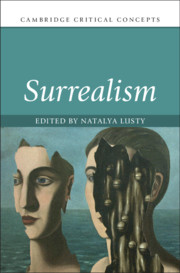Book contents
- Surrealism
- Cambridge Critical Concepts
- Surrealism
- Copyright page
- Contents
- Illustrations
- Notes on Contributors
- Acknowledgments
- Introduction: Surrealism’s Critical Legacy
- Part I Origins: Ideas/Concepts/Interventions
- Part II Developments: Practices/Cultures/Material Forms
- Part III Applications: Heterodoxies and New Worlds
- Select Bibliography
- Index
Introduction: Surrealism’s Critical Legacy
Published online by Cambridge University Press: 23 July 2021
- Surrealism
- Cambridge Critical Concepts
- Surrealism
- Copyright page
- Contents
- Illustrations
- Notes on Contributors
- Acknowledgments
- Introduction: Surrealism’s Critical Legacy
- Part I Origins: Ideas/Concepts/Interventions
- Part II Developments: Practices/Cultures/Material Forms
- Part III Applications: Heterodoxies and New Worlds
- Select Bibliography
- Index
Summary
The introductory chapter traces Surrealism’s critical legacy across the twentieth and twenty-first centuries. From its initial emergence out of Dada in 1924, Surrealism became a defining critical and creative concept, and not only for the avant-garde movement penned in its name. It inspired a range of critical enterprises and creative practices, including: Walter Benjamin’s anthropological investigation of the everyday material world; the politics and aesthetics of a number of anticolonial enterprises; James Clifford’s investigations of the ethnographic ambitions of dissident surrealism; the political events of May ’68; the October group’s recalibration of Greenberg’s aesthetic formalism; and, more recently, Surrealism’s influence on new materialism, thing theory, animal/human studies, affect theory, and a plethora of contemporary participatory art movements. Described by Maurice Blanchot as “a brilliant obsession,” Surrealism continues to exert a profound rethinking of the relationship between art, politics, and everyday experience.
Keywords
- Type
- Chapter
- Information
- Surrealism , pp. 1 - 28Publisher: Cambridge University PressPrint publication year: 2021

